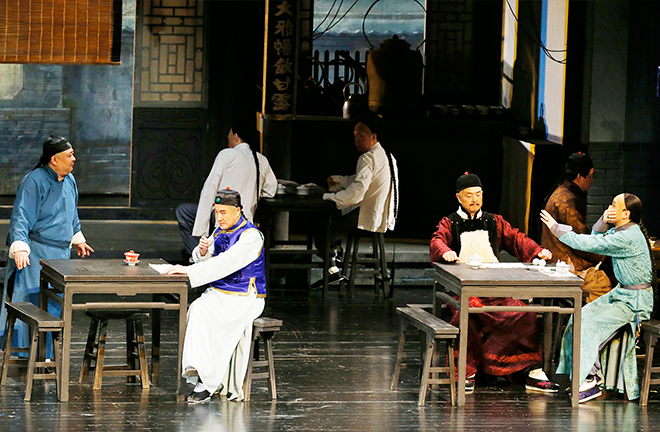Historical data expands contemporary literary studies

A drama performance of Teahouse by Chinese writer Lao She (1899–1966) Photo: CFP
The compilation and investigation of historical materials has become a research topic of contemporary literature, generating considerable controversy among academic circles.
Expanding research scope
“Increased attention paid to historical data represents a significant change in contemporary literature studies,” said Zhang Jun, a professor from the Department of Chinese at Sun Yat-sen University. As the time span of “contemporary literature” has lengthened, batches of literary works are no longer truly “contemporary.” As a result, it is natural for some scholars to deal with these works utilizing research methods from literary history.
Literary history research has always highlighted the role of historical materials. This trend also directs contemporary literary research, Zhang continued. Recent studies on manuscripts and editions of contemporary literary works, as well as diaries and letters of contemporary writers, are all based on historical data.
“The collection and compilation of historical materials opens up new space for contemporary literary research,” said Zhang Liqun, a professor from the Qingdao Institute of Humanities and Social Sciences at Shandong University. The reason why historical data has turned into a hot research topic of contemporary literature is ascribed to objective factors including massive data and rich content.
However, Zhang Liqun continued that the pure compilation of historical data is merely basic work, while the real task is to dig out the academic essence behind the historical data. The real focus should be applying historical data to specific research to draw new conclusions, enriching literary history research, or even challenging established conclusions. Hence, the statements of “living historical data,” and the “purposiveness” and “problem-oriented awareness” of historical data research, actually put forward higher requirements on the subjective dimension of researchers.
Historical data and literary criticism
At present, some scholars who value historical material studies argue that those good at criticism lack a sense of history and cultural background. In the eyes of the latter, meanwhile, the former does only textual research without interpretation, and even exaggerates the role of historical materials in research. In Zhang Liqun’s view, mutual questioning points out their problems—one side’s shortcomings are precisely the other side’s strengths. Attributes of contemporary literary research determine that they are bound to generate a host of commentaries on writers, their works, and even news. Therefore, criticism is necessary, and today’s criticism is tomorrow’s historical data. Likewise, the results of historical data research need to be interpreted in vivid writings. Mutual complementation serves to better the development of contemporary literature.
Zhang Jun said that the “school of historical data” mainly examines literature from 1950 to 1970, while critics focus more on literature over the past 30 years. Research methods vary with different research objects. There was originally nothing to argue about. The current fierce debate seems to derive from the fact that they are categorized in the same field of “contemporary literature.” In fact, though literature from 1950 to 1970 no longer belongs to the “contemporary” in the real sense, the name “contemporary” is often used in discussions. This inevitably causes critics to misbelieve that their peers hope to universalize the research method of historical data.
Zhang Jun added that the controversy might also relate to the “territorial” consciousness of some critics. For a long time, contemporary literature has had nothing but the research topic of criticism, with most disciplinary discourse power and academic resources possessed by critics. Now the sudden emergence of the historical school is likely to cause certain resistance among critics. Under the current situation, the two sides are better poised to draw out each other’s strengths and avoid indiscretions. Scholars engaged in the collection and compilation of literary historical data have also made efforts at “historicization” and overall theoretical thinking. The combination of historical data and interpretation not only embraces the subjectivity of researchers, but also gives a desirable direction for historical data studies to avoid fragmentation.
“The compilation of historical data and ideological culture are two interrelated research dimensions with different highlights,” said Zhang Lijun, a professor from the College of Liberal Arts at Jinan University. Research on historical materials requires profound thought, vision, and insight to distinguish the value and the mining direction of historical materials. In-depth research and major breakthroughs in thought, culture, and aesthetics are often built upon new discoveries, new excavations, and new analyses of historical data. Historical data and ideological studies are only different in research focus, dimensions, and interest, but not in value height.
Avoiding overemphasizing historical data
According to Wen Fengqiao, a professor from the College of Liberal Arts, Journalism and Communication at Ocean University of China, literary research, especially contemporary literary research, takes current academic forms, and thus needs to maintain a dialogue with society. Excessive emphasis on the value of historical materials in contemporary literary research shows some sort of retreat or aphasia of contemporary literary research from the “contemporary.” High vigilance should be taken to avoid entering the maze of working on historical materials for the sake of historical materials. Otherwise, this will weaken disciplinary features and advantages, stifling the vitality of contemporary literary research.
“Historical data research may easily go astray by only observing details, but ignoring the complex emotions entangled and intertwined behind the materials, and overlooking the subjectivity and integrity of man,” Zhang Lijun concluded. As historical materials serve the in-depth study of our subjective world, we will lose our way once falling into the trap of working on historical materials only for historical materials’ sake. A suitable path for literary scholars that offers both interest and prospect is located in digging deep into historical materials for the rich humanistic connotations behind them.
Edited by YANG LANLAN
